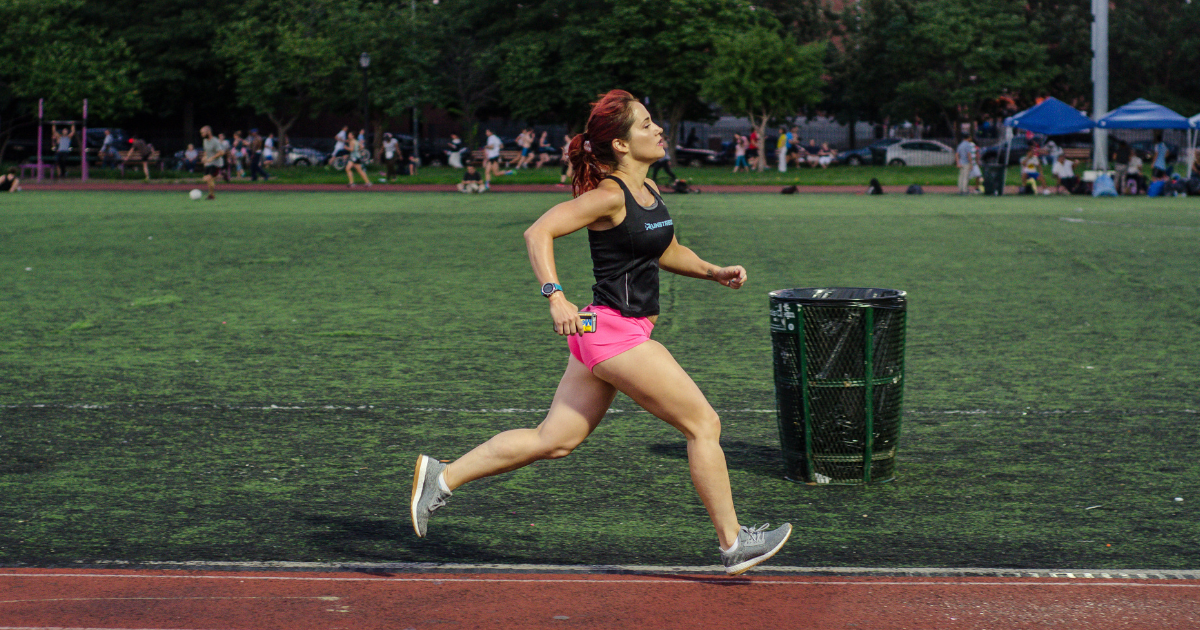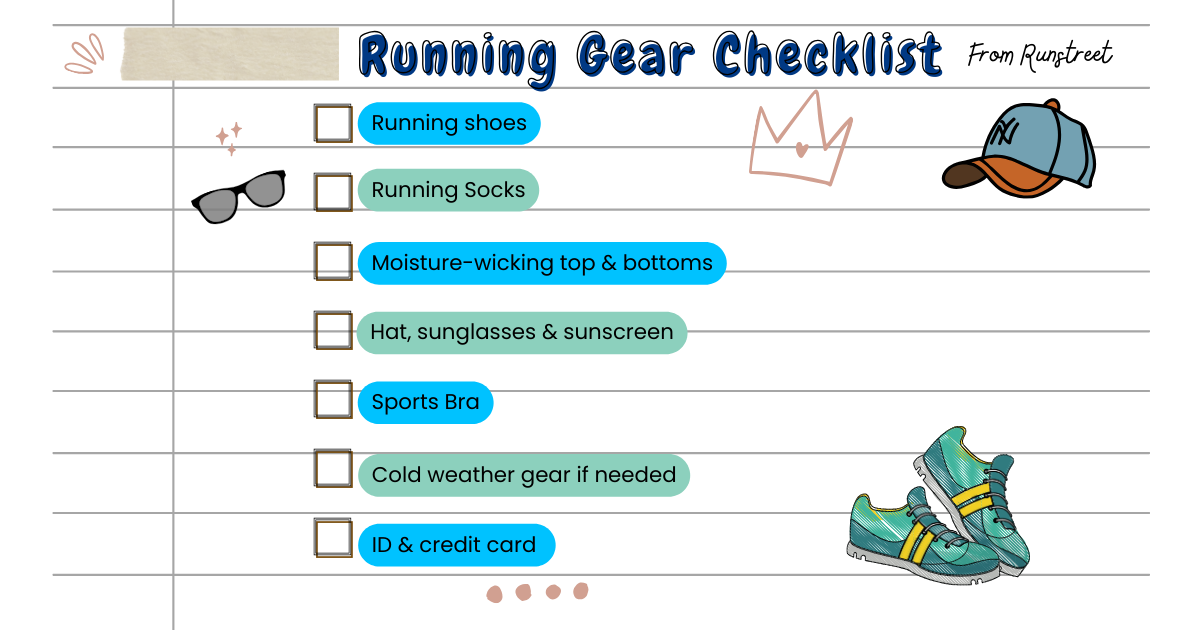Half Marathon Training Program and Tips from a Run Coach
Photos by Marques Jackson Photography.
By Marnie Kunz,
Certified run coach and trainer
A good half marathon training program will help you tackle the challenge of running a half marathon. At 13.1 miles (21.1 kilometers), a half marathon is a challenging yet rewarding race distance to run. As a longtime runner and coach, I have to say it’s one of my favorite race distances. Training for a half marathon will whip you into great shape for tackling endurance challenges (like running far) while still allowing you enough time and energy to do strength training and other fitness activities. If you want to run a half marathon, this guide includes half marathon training plans and tips to help you train for your best half marathon race.
Related: 15 Best Half Marathons in the World
Half Marathon Gear - Training Essentials
This checklist will help you plan what to wear for your runs.
If you’re planning on running a half marathon, there are a few training essentials you’ll need for training and racing. First, invest in a comfortable pair of running shoes. Running shoes are the most important piece of equipment you’ll need to run injury-free. If you’re not sure what shoes to get, head to a local running store to get fitted for shoes so you can find ones that work best for your foot type, gait, and running habits.
If you already have running shoes, make sure they’re not too worn. Running shoes usually last between 300 and 500 miles (quite a range, I know!). If your shoes start to feel flat or you have nagging aches and pains, it’s probably time for new shoes. Running in worn shoes is one of the most common causes of running injuries. You can prevent this by changing your kicks regularly.
Related: When to Change Your Running Shoes
You’ll also need moisture-wicking running clothing for training. Dress in layers, especially during changing weather, so you can peel off layers if you get too warm while running. The good news is once you get the right running gear, you'll have it for every race distance, whether you're running a 5K or full marathon.
Related: What to Wear Running
Half Marathon Training Programs
A good half marathon training program will build your general fitness to conquer 13.1 miles. Running a half marathon requires planning ahead and following a training schedule if you want to have the best race experience. A training plan is crucial to make sure you get in your workouts and build your endurance for race day while minimizing your risk of injuries.
If you need a half marathon training plan, I am including my best recs below for half marathon plans designed by a certified run coach and fitness trainer (me:).
Customized Half Marathon Training Program
The best half marathon training program will take into account your current fitness level, schedule, history of injuries, and your running goals. A personalized half marathon plan gives you a training program fine-tuned to your individual needs.
The Runstreet Customized Running Training Plan assesses your current fitness, schedule, and goals to create a unique plan that works for your life. Your plan will include:
Gradual progression: Build a strong foundation to avoid running injuries.
Strategic workouts: Incorporate a mix of runs, strength training, and cross-training.
Rest and recovery: Essential built-in rest and recovery days designed to help you perform better on race day.
Motivational support: Stay on track with personalized support and feedback from your coach.
Beginners Half Marathon Training Plan
If you are running your first half marathon and don’t have the funds to invest in a personalized running plan, I have a free Beginner’s Half Marathon Plan that gives you an 8-week training plan to build your endurance for running a half marathon. This novice program can help prepare you for your first race that’s 13.1 miles.
Training with people can help you stay motivated.
Intermediate Half Marathon Training Plan with Speed Workouts
If you’re an experienced runner, you may have pace goals for running a half marathon. Speed workouts are the key components of a half marathon program that will help you get faster and hit your goal half marathon pace. Runstreet’s Intermediate Half Marathon Training Plans include speed workouts, long runs, base runs, rest days, and coaching support.
Whether you have a half marathon in 2 months, 3 months, or more, you can download our half marathon programs with speed workouts to step up your training for an amazing race day:
Related: Best Half Marathon Workouts to Get Faster
Training Basics for Running a Half Marathon
When you’re training for a half marathon, there are some key strategies that will help you succeed. From eating enough carbs to taking it easy on base run days, these are some training musts for running a half marathon:
Nutrition
Many runners I meet are not fueling properly. They often don’t eat enough nutritious foods and sometimes don’t take fuel on long runs. The truth is that you’ll need to eat plenty of the right foods to have the energy you need to conquer a half marathon. Eat a diet rich in carbohydrates in the form of whole grains like whole wheat bread, oatmeal, brown rice, and quinoa.
Protein is another essential macronutrient that will help you in your training. Eating enough protein improves your muscle recovery after workouts, helps build strong muscles during training, and can help you run more efficiently. Some lean protein-rich foods include tofu, Greek yogurt, lentils, beans, and lean meats.
In addition to eating enough nutrients in your daily life, you’ll also need to take running fuel during your long runs. For long runs over an hour, take gels, chews, or Gus for carbs. Your body depletes its stores of glycogen for energy during long runs and running fuel will help you replenish the energy stores.
Aim to consume 25 to 30 grams of carbohydrates about every 45 minutes during your long runs. Training is a good time to experiment to find the flavors and consistency of running fuel that works best for you.
Hydrating is also essential for long runs and running in heat and humidity. Bring a water bladder or bottle on your long runs and drink a sports drink or electrolytes formula (you can drop a nuun tablet or powder like Skratch hydration mix into your water). Drink frequently during your long runs, taking a sip or two at least every mile.
A training plan will help you crush your half marathon goals.
Training Plan
Running a half marathon requires a training plan. It’s not a race distance that you can just get up and run with no training.A training plan gives you the blueprint you need to succeed and run your best race. A good training plan will include a running schedule and build your weekly mileage gradually to improve your fitness level while keeping your risk of injury low.
For a half marathon training plan to help you have the best race experience, visit the Runstreet Training Center.
Base Runs
Your half marathon training will include a lot of base runs, which are relaxed pace runs. These easy running days help build your fitness level while also allowing your body time to recover from harder workouts like long runs.
For your base run days, remember to go at an easy pace. Runners I coach are often tempted to go faster on easy run days but this increases your chances of overtraining and getting injured. So keep your easy runs easy and enjoy them!
Related: How to Do a Base Run
Long Runs
A weekly long run is one of the most important parts of a half marathon training routine. Do your long run at a relaxed pace and build your mileage gradually. Many runners do their long runs on Saturday or Sunday when they’re off work and have time to run and recover.
Related: 10 Long Run Tips from a Run Coach
Speed Training
Speed training is crucial to run a faster race pace.
For intermediate runners who have already conquered a half marathon, speed training is the ingredient that will help you get faster and PR in your race. An intermediate half marathon training plan should include speed workouts like tempo runs and intervals to help train your body to run at a faster race pace.
One of my favorite workouts to help half marathon runners get faster is Mile Repeats. These long interval workouts can help you tap into a faster pace and train your body to maintain faster speeds consistently.
Strength Training
Runners often overlook strength training but it’s a powerful way to reduce your risk of injuries and help you run faster. Strengthening your muscles can improve your running form and efficiency and help you hit a faster race pace.
For a beginner-friendly strength workout, do some bodyweight exercises that target your upper body (such as push-ups and seated dips), core (planks), and lower body (squats and side lunges).
Download our free Beginners Home Workout Program to get started with bodyweight exercises you can do anywhere.
Related: 8 Hip Strengthening Exercises for Runners
Cross Training
Cross training for runners means doing any exercise that’s not running. Taking some cross training days (usually at least once a week) during your half marathon training can help improve your fitness level while giving your body a break from running. Some low-impact cross training workouts that can be great for runners include cycling, walking, hiking, yoga, pilates, and swimming.
Related: Recommended Steps Per Day By Age
Rest Days
A solid running training plan will have regular rest days built into your schedule. It’s important to have days where you have a complete break from exercise for your body and mind to recover from training.
Recovery runs, which are low-intensity, easy runs in short distances, are also helpful for half marathon training. Having recovery built into your training program will help prevent injuries and burnout.
Tapering
Tapering means reducing your running mileage as you get closer to your big race. For half marathon runners, you will usually do your longest run about two weeks before your race. Your taper will include shorter runs and more rest time to help your body hit peak performance on race day.
Half Marathon Training Tips
These tips will help you prepare your body and mind for running a half marathon:
Consistency will help you prepare for your half marathon.
Track your workouts. Use a running watch (I love my Garmin Forerunner 55) or running app to track your running miles and pace. This will help you stay motivated and accountable in your half marathon training.
Be consistent. It may not feel like skipping a workout or cutting down your mileage will hurt you and it won’t if you do it once or twice. But skipping workouts can easily slide into falling off your training program completely so aim to be as consistent as you can. Every workout will help you get to the finish line better when your half marathon race day comes.
Reward yourself for progress. When you hit a milestone, such as running farther than you ever have or nailing all your interval splits, give yourself recognition. Do something nice for yourself and celebrate your achievements.
Be flexible. Although consistency is key, flexibility will also help you succeed in your training. If the weather is bad or you can only run late at night, hit the treadmill for your run. And if you do miss a workout, don’t beat yourself up - just get back to your regularly scheduled training the next day. You can also be flexible about your rest days. If you're especially sore from training or mentally drained, an extra rest day can do a lot to help you in the long run.
Take it easy between speed workouts and long runs. Speed training and long runs are considered hard training days so it's important to have easy or rest days between these intense workouts. If you do speed work on Tuesday, for instance, then don't do another hard workout until Thursday at the earliest. And Monday, the day before your speed session, would be great for cross training or a relaxed pace base run.
Related: Half Marathon Training Strategy from a Coach
FAQs
How long should a beginner run a half marathon?
Beginners take at least two hours to run a half marathon, usually in the 2:30 range.
Do I need to run 13 miles before a half marathon?
Most runners do not need to run 13 miles to prepare for a half marathon. Depending on your fitness level and goals, running 10 to 12 miles for the longest run in your half marathon training program is usually sufficient.
How long does it take to get in shape for a half marathon?
It usually takes between 2 to 3 months to get in shape for a half marathon. Beginners who are new to running may need at least 4 months to train and prepare for a half marathon. More experienced runners who already can run at least 10K may only need 2 months (8 weeks) to train for a half marathon.
If you need a half marathon training program to help you slay your big race, visit the Runstreet Training Center for the best plans. For more training tips and workouts, sign up for the Runstreet Wellness Wednesday Newsletter. Follow and tag @Runstreet on Instagram to stay in touch and get cheered on in your workouts.
Happy running to you!
Related Posts: All Your Half Marathon Questions Answered, What to Eat Before a Long Run, Is Caffeine Before Running Helpful? An Expert Weighs In
Marnie Kunz is a NASM-certified personal trainer and USATF- and RRCA-certified running coach based in Brooklyn, NY. Marnie likes helping people get and stay active to enjoy a better quality of life. When she’s not doing fitness things, Marnie enjoys exploring with her dog, a mischievous rescue Akita.








